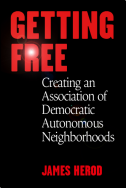On the Nature of the Fight
James Herod
July 1975
The old images of heroism and courage really don't work anymore. There are of course still instances when one is being attacked physically. But even these are usually under conditions such that a fight, in the traditional physical sense, is out the question. The attacks come in the form of torture usually, where the overwhelming superiority of the aggressor is the decisive factor. We are attacked in the police station and beaten up, one by one, by a gang of cops, in the backroom.
But in the course of everyday life this is not how we are attacked. We are attacked through malnutrition by the food profiteers. We are attacked sensually by the sex exploiters. We are attacked financially by the landlords, tax collectors, insurance agents, price hikers, and shysters of every brand. We are attacked constantly by advertisers, educators, psychiatrists, counselors, lawyers, doctors, dentists, mothers, fathers, priests, capitalists, and bureaucrats. The bulk of the letters, even, which arrive in the mailbox are threatening and intimidating. It is no wonder that people turn to killing and bombing.
The kind of courage you need to fight this kind of battle is very different from the kind of courage you need for a fist fight or shoot out. Yet fist fighting courage is the image of courage that is constantly put before us. We see Dustin Hoffman fighting off a gang of rapists and murders single-handedly. We see Paul Newman pitting himself as a lone rebel against the entire prison guard.
But how do you fight loneliness and isolation? How do you fight against the fact that they have eliminated all of your social relationships except the ones that tie you to them, to the creditors, licensors, certifiers, employers, and realtors. What does the courage look like that is needed to fight not a gang of hothead invaders but an entire way of life. Most of the time I never even see my real enemies. They are there certainly. They exist as real live beings. But I never see them. Every letter I receive from Columbia University is written by a different person, probably a part-time graduate student. The real estate agent I must deal with, Irving Wollman, is only a highly paid agent of the big wigs, Hanfield, Callen, Ruland, and Benjamin, who are themselves probably owned. The corporate giants who force prices through the ceiling are great amorphous impersonal nonentities. I do see an enemy or two here and there, usually a very small fish, a petty profiteer who is usually about to sink too. I see the corner grocer, although I never see A&P. I see my dentist, but do I ever see Metropolitan Life, AMA, Columbia Presbyterian Hospital, New York City, the New York Higher Education Assistance Corporation, Hollywood, CBS, the mafia men who promote go-go and skin flicks? No.
It is no accident that the physical kind of courage, heroic fist-fighting, is held up as the ideal. It is so very ineffective against the kinds of aggression most of us are hit with everyday. If they portrayed the real fight it would lead to trouble, for them.
For the real fight you need perseverance as much as anything. And you need to pick your fights very, very carefully. If you refuse to comply across the board, and fight on all fronts simultaneously, you are dead. If you blow up you are done for too. You need intelligence as much as brute strength. Basically it is a question of outwitting the enemy, of out maneuvering them, and then overwhelming them, with an intelligent, collective, and consciously applied rage.

